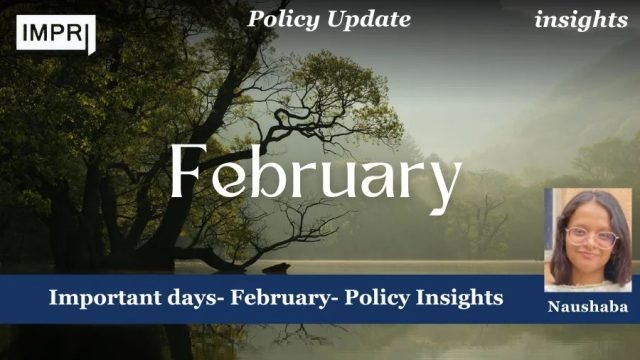Policy Update
Naushaba
Though the shortest month, February holds an abundant significance, each day honouring unique causes, emotions, and movements. From global awareness days to cultural celebrations, February offers moments to reflect, connect, and inspire.
February 2: World Wetlands Day
World Wetlands Day is celebrated on February 2 to raise awareness about the vital role of wetlands in sustaining biodiversity and supporting human life. Established in 1971 by the United Nations General Assembly, this observance commemorates the adoption of the Ramsar Convention on Wetlands, which aims to promote the conservation and sustainable use of these critical ecosystems. Each year, a specific theme is chosen to highlight pressing issues related to wetlands, such as climate change, pollution, and habitat loss. Events and activities worldwide encourage individuals and communities to recognise the importance of wetlands and take action to protect them.
February 2: Rheumatoid Arthritis (RA) Awareness Day
RA Awareness Day, observed on February 2, focuses on raising awareness about rheumatoid arthritis (RA), a chronic inflammatory disorder that primarily affects the joints. This day aims to educate the public about the symptoms, causes, and impact of RA on individuals and their families. It serves as an opportunity to promote early diagnosis and effective management of the condition, encouraging those affected to seek support and treatment. Various campaigns, events, and educational resources are organized to foster understanding and empathy for those living with RA.
February 4th marks World Cancer Day, a global initiative dedicated to raising awareness about cancer, its prevention, and treatment. Established by the Union for International Cancer Control (UICC) in 2000, this day seeks to unite the world in the fight against the second leading cause of death globally. With its annual theme, World Cancer Day emphasizes the importance of collective action, early detection, and equitable access to care. By encouraging education, research, and support for patients, the day strives to reduce the burden of cancer and empower individuals and communities to take proactive steps in the battle against this devastating disease.
February 6: The International Day of Zero Tolerance to Female Genital Mutilation
February 6th marks the International Day of Zero Tolerance to Female Genital Mutilation (FGM), a United Nations-led initiative aimed at eradicating this harmful practice. FGM refers to all procedures involving partial or total removal of the female external genitalia or other injury to the female genital organs for non-medical reasons. It affects millions of girls and women worldwide, poses severe health risks and violates their human rights. This day calls for global collaboration, education, and advocacy to protect women and girls from the physical and psychological trauma caused by FGM. By raising awareness and mobilizing efforts, the day highlights the urgent need for cultural shifts, stronger policies, and community-based interventions to put an end to this form of gender-based violence.
February 8: National Opera Day
National Opera Day, celebrated on February 8, honours the rich tradition of opera and its contribution to the performing arts. This observance highlights the cultural significance of opera as a unique blend of music, theatre, and storytelling. Events may include performances, educational programs, and discussions that celebrate the artistry and history of opera. National Opera Day serves to engage audiences of all ages and promote appreciation for this timeless art form, encouraging participation in opera-related activities and performances.
World Pulses Day is celebrated on February 10 to highlight the nutritional benefits and environmental significance of pulses, such as beans, lentils, and chickpeas. Established by the United Nations General Assembly, this observance aims to raise awareness about the importance of including pulses in diets for their health benefits and their role in promoting sustainable agriculture. Pulses are rich in protein, fiber, and essential nutrients, making them an important food source for millions worldwide. Events and activities are organized globally to promote the consumption and cultivation of pulses, advocating for food security and sustainable farming practices.
February 10: National De-worming Day
February 10th is observed as National De-worming Day in many countries, including India, focusing on eradicating intestinal worms in children. Intestinal parasitic infections can lead to malnutrition, impaired cognitive development, and poor academic performance. This initiative, spearheaded by governments and health organizations, aims to provide mass deworming treatment to children, improving their overall health and well-being. Through the widespread administration of safe and cost-effective deworming tablets, the day seeks to reduce the burden of parasitic infections and promote healthier childhood development.
February 11: The International Day of Women and Girls in Science
February 11th is celebrated as the International Day of Women and Girls in Science, highlighting the vital role women and girls play in advancing scientific knowledge and innovation. Despite significant contributions, women remain underrepresented in STEM fields globally. This day, established by the United Nations, promotes gender equality in science and empowers women to break barriers and pursue careers in scientific research, technology, engineering, and mathematics. By showcasing female role models and advocating for inclusive education and opportunities, the day encourages a future where women and girls can thrive equally in science and innovation.
February 12: National Productivity Day
February 12th marks National Productivity Day, emphasizing the importance of efficiency and effectiveness in all sectors of the economy. It encourages individuals, businesses, and governments to adopt productive practices that maximize resources, reduce waste, and enhance overall growth. Celebrated in countries like India, the day aligns with national efforts to promote sustainable development and economic competitiveness. Through seminars, workshops, and awareness campaigns, National Productivity Day inspires a culture of continuous improvement and innovation, contributing to a nation’s progress and prosperity.
February 13th is observed as World Radio Day, a UNESCO initiative celebrating radio’s enduring impact as a medium for communication, education, and entertainment. Radio has the power to reach the most remote communities, making it a vital tool for spreading information and fostering dialogue across diverse societies. Each year, World Radio Day highlights the role of radio in promoting democratic discourse, cultural exchange, and emergency response, while recognizing its adaptability in the digital age. The day also honours the contributions of radio broadcasters and advocates for continued access to this accessible and reliable form of communication.
February 13: International Epilepsy Day
International Epilepsy Day, observed on February 13, aims to raise awareness about epilepsy, a neurological condition that affects millions of people worldwide. This day emphasizes the need for education, understanding, and support for individuals living with epilepsy, as well as their families and caregivers. Events often include campaigns, educational programs, and community activities designed to dispel myths about epilepsy, promote understanding, and advocate for better access to treatment and support services.
February 14: World Congenital Heart Defect Awareness Day
World Congenital Heart Defect Awareness Day is observed on February 14 to raise awareness about congenital heart defects (CHDs), which are structural problems with the heart present at birth. This day aims to educate the public about the importance of early diagnosis, treatment, and ongoing care for individuals with CHD. Events and activities may include awareness campaigns, community events, and educational resources to support families affected by congenital heart conditions, emphasizing the need for research, funding, and advocacy for improved healthcare services.
February 14: Valentine’s Day
February 14th, known worldwide as Valentine’s Day, is a celebration of love and affection between romantic partners, family, and friends. Rooted in both historical and cultural traditions, the day has evolved into a global expression of love, with people exchanging gifts, cards, and messages of admiration. Beyond romantic gestures, Valentine’s Day serves as a reminder to cherish all forms of love and connection, fostering relationships and spreading kindness. While often commercialized, the spirit of the day centers on heartfelt expressions and celebrating those we care about most.
February 16: World Anthropology Day
World Anthropology Day, celebrated on February 16, recognizes the discipline of anthropology and its contributions to understanding human societies, cultures, and behaviours. This day aims to promote awareness of anthropology’s role in addressing contemporary issues and fostering cultural appreciation. Events may include discussions, lectures, and cultural activities that engage the public in exploring anthropological themes and celebrating the diversity of human experiences. World Anthropology Day encourages individuals to appreciate the insights that anthropology offers into the complexities of our world.
February 20: The World Day of Social Justice
February 20th marks the World Day of Social Justice, an observance established by the United Nations to promote fair and just relationships within societies. This day emphasizes the need for equal opportunities, the elimination of discrimination, and the creation of equitable conditions for all people, regardless of gender, race, or economic status. It calls for global action to reduce poverty, ensure access to employment and education, and uphold human rights. The day serves as a reminder that achieving social justice is fundamental to fostering peaceful and inclusive societies.
February 21: International Mother Language Day
February 21st is celebrated as International Mother Language Day, a UNESCO initiative aimed at promoting linguistic and cultural diversity. The day highlights the importance of preserving and fostering native languages, which play a crucial role in identity, heritage, and communication. With many indigenous languages facing extinction, this day raises awareness of the need to protect linguistic diversity and ensure that all languages, especially those of minority groups, are recognized and supported. By celebrating multilingualism, International Mother Language Day encourages dialogue, tolerance, and respect across cultures.
February 24: Central Excise Day
February 24th is celebrated as Central Excise Day in India, honouring the contributions of the Central Board of Indirect Taxes and Customs (CBIC) in regulating and collecting excise duty. The day acknowledges the pivotal role of the excise department in maintaining the country’s economic stability by curbing tax evasion and ensuring proper enforcement of regulations. It also highlights the efforts of excise officers who work to protect the economy by ensuring compliance with laws related to the production and sale of goods. Central Excise Day aims to raise awareness about the importance of indirect tax collection in national growth.
World NGO Day is observed on February 27 to recognize the important contributions of non-governmental organizations (NGOs) in addressing social, environmental, and humanitarian issues. This day celebrates the work of NGOs around the world and promotes collaboration between various sectors to drive positive change. Events and activities may include discussions, workshops, and recognition ceremonies that highlight the impact of NGOs in their communities. World NGO Day serves as a reminder of the vital role that civil society plays in advocating for social justice, human rights, and sustainable development.
February 28: National Science Day
February 28th marks National Science Day in India, commemorating the discovery of the Raman Effect by renowned physicist Sir C.V. Raman in 1928. Celebrated annually since 1987, the day recognizes the critical role science and technology play in the nation’s progress. National Science Day encourages scientific thinking, research, and innovation, especially among students and young scientists. Various educational institutions and research organizations hold seminars, exhibitions, and workshops to promote scientific awareness and honour the achievements of Indian scientists. The day serves as a reminder of the transformative power of science in addressing global challenges and advancing society.
In conclusion, these observances initiated by global organizations, governments, or movements, remain relevant due to their ongoing significance in raising awareness, addressing societal issues, and promoting global and national causes. By recognizing and participating in these observances, we not only honour their significance but also contribute to the ongoing dialogue and action needed to address challenges and inspire progress. As we embrace the themes of each day, let us strive to create a more equitable, inclusive, and enlightened world for all.
About the Contributor: Naushaba (she/her/hers) is a research intern at the Impact and Policy Research Institute and a postgraduate student of the Academy of International Studies, Jamia Millia Islamia. Her research interests lie in Gender Studies, Global Politics, Climate Change and Sustainable Development.
Acknowledgement: The author would like to thank Arohi Sanyal and Dhruv Tapadia for the successful completion of this article.
Read more at IMPRI:
Important days- January- Policy Insights
Resilience in Action: NITI Aayog’s Vision for Pandemic Preparedness and Global Collaboration



















